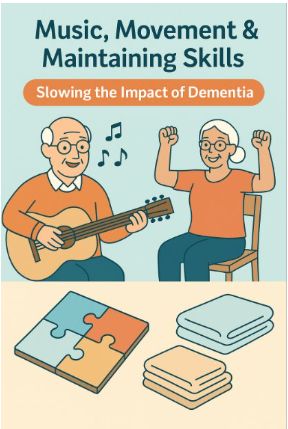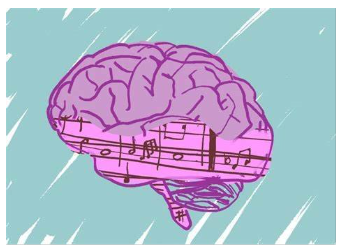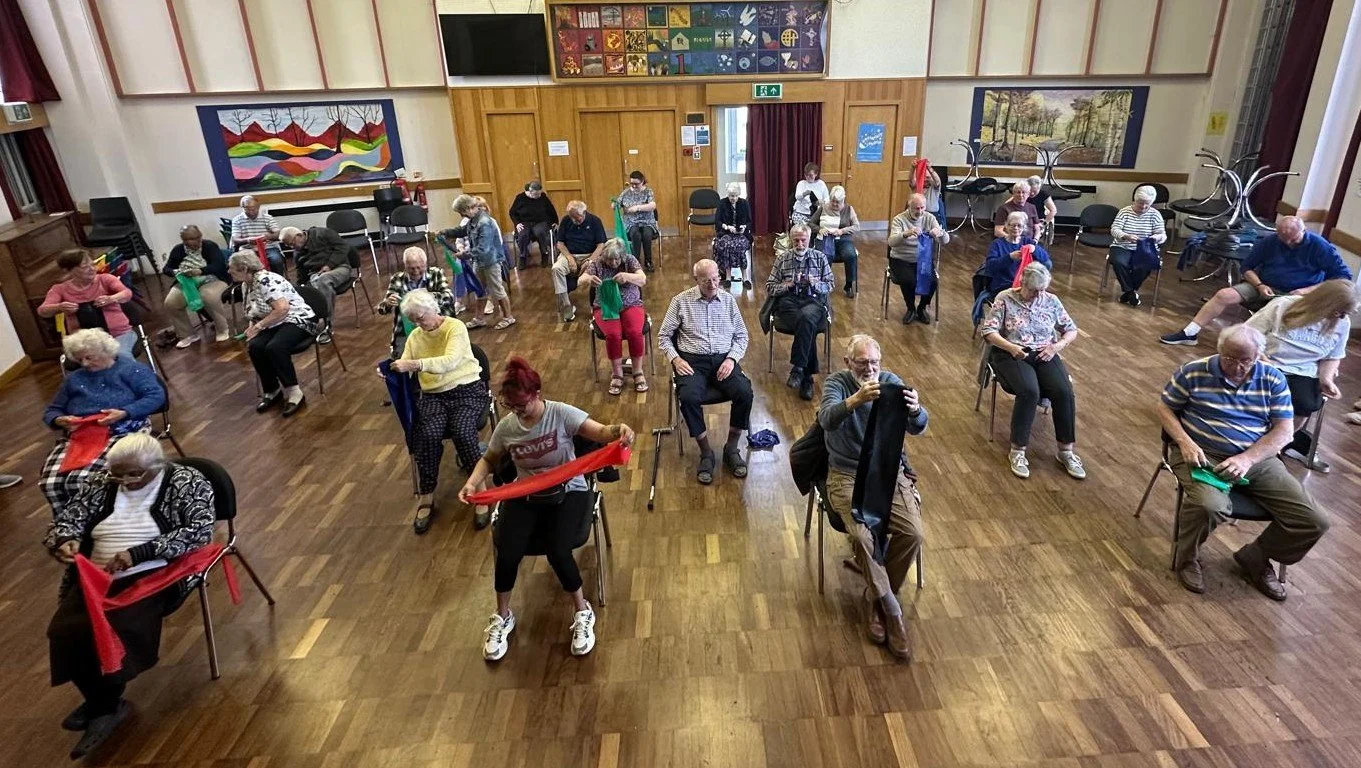Living Well With Dementia
Slowing the Impact of Dementia
In this blog, we are going to explore the powerful ways music, exercise, and meaningful activities can help slow the progression of Dementia. From the joy of familiar songs unlocking memories, to gentle seated exercise improving blood flow and lifting mood, we look at how staying active — physically and mentally — can make a real difference.
There are Powerful Ways to Slow the Progression of Dementia.
We also review everyday skills that can be preserved through routine, creativity, and connection. Whether it’s baking a cake, singing a favourite tune, folding laundry, or doing a puzzle — these moments help People living with Dementia feel capable, confident, and more like themselves.
Music
Music has many benefits for people with dementia. Even in the later stages, when people may lose the ability to communicate in other ways, they can often sing, hum or tap along with the music they hear.
Research has shown that music can:
improve attention;
improve cognition (thinking);
improve memory;
improve speech and communication;
reduce heart rate and blood pressure;
trigger the release of hormones called endorphins, which have pain-killing properties and can boost mood;
reduce agitation, anxiety and depression in some people.
Tips on How to Introduce Music
Start by playing music quietly to see how the person responds. Some people find loud or fast music overwhelming;
Music may induce sad emotions and memories, so be on standby to hold their hand to comfort them or if needs be turn the music off;
Background music/ noise can be distracting. Some people will find it difficult to process the different sounds that they are hearing, leading to anxiety and discomfort;
Background noise can also get in the way of concentration and communication;
Consider the person’s cultural and religious background. If English is not their first language, you could look for music in their own language. They might enjoy hymns, carols or other religious music.
How we use Music at ‘ADS’
Music can be used in a range of ways. Music can help People with Dementia express feelings and connect with memories. It can also help them communicate and engage with others, and form and maintain relationships;
We have also designed a service for local Asian People with Dementia and their Carers.
At ‘ADS’, we hold singing classes three times a week;
Seated exercises 3 times a week;
Moves and Grooves once a month.
We have also designed a specific service for local Asian People with Dementia and their Carers to help improve mood and wellbeing through music and gentle exercise.
We have members of our charity with musical backgrounds. We encourage them to keep using their talents. Whether it be someone who used to love dancing to get up and have a jig, or someone who used to be a music teacher get up and play on a keyboard.
Preserving these skills- is good for the brain;
We have to keep using it: "use it or lose it!"
Playlist for Life
Making a playlist is easy to do. Find the right music - ensure that it is personal and meaningful to the individual.
A tool like https://www.playlistforlife.org.uk/ is ideal for making a meaningful playlist, or you may already have a spotify, or apple music account and can easily make a list on that also.
The Powerful Impact of Music
Music reaches parts of the brain that remain unaffected even as the memory fades.
Music has a powerful impact on People living with Dementia. It reaches parts of the brain that remain unaffected even as the memory fades. Familiar songs can unlock long-lost memories, spark conversations, and bring moments of joy, calm or connection.
Whether it be singing along, tapping to the beat, or simply listening quietly, music can reduce anxiety, ease agitation, and lift the mood. It can also encourage movement and social interaction, helping People feel more like themselves again - even if it is just for a short while.
In short, music doesn’t just bring back memories, it brings back a sense of identity, comfort and dignity.
Exercise
Exercise is hugely beneficial for People living with Dementia - not just for their physical health, but also for their mental and emotional wellbeing.
Regular movement helps improve blood flow to the brain - which is especially important in vascular dementia.
Exercise also supports heart health and can help slow down cognitive decline.
Exercise releases 'feel good' chemicals like dopamine and endorphins, which boost mood, reduce anxiety and help with sleep.
How we use Exercise at ‘ADS’
Even gentle movements increase heart rate, improve circulation, and support joint health.
Our Seated Exercise Classes we do at ‘ADS’, are designed to be fun, safe and accessible for all abilities. We focus on gentle movements that increase heart rate, improve circulation, and support joint health.
Activities also help with coordination, balance, and muscle memory, and encourage People to stay engaged and active.
Most importantly, these sessions offer a chance to connect, laugh, and move together – making exercise classes something to look forward to!
Preserving Skills with Dementia
In order to preserve skills with Dementia the Following Activities are recommended:
Daily Routines: Keeping a consistent routine helps reinforce memory and confidence. Repeating familiar tasks like making a cup of tea, folding laundry, or setting the table can maintain independence and a sense of purpose;
Creative Activities: Painting, crafting, knitting, or even simple colouring can help with motor skills, focus, and self-expression. These also stimulate the brain in gentle, meaningful ways;
Reminiscence Activities: Looking through old photos, handling keepsakes, or listening to music from the past can spark conversation and strengthen personal identity;
Puzzles and Games: Simple word searches, jigsaws, bingo, or matching games can keep the brain active and provide gentle cognitive challenges;
Cooking and Baking: Involving someone in safe, simple parts of cooking – stirring, mixing, choosing ingredients – preserves life skills and creates moments of joy and familiarity;
Gardening: Whether watering plants, planting seeds, or just being outdoors, gardening is grounding, soothing, and keeps the senses engaged;
Volunteering or Helping Others: Finding small ways to contribute – helping lay out chairs, handing out leaflets, or welcoming others – reinforces a sense of value and community;
Learning New Things (in bite-sized ways): It’s never too late to learn. Trying a new hobby, language, or skill (with support) can be empowering and stimulating.
Doing the Small Things Consistently
As we’ve discovered, there are so many simple, powerful ways to support Someone living with Dementia — through music, gentle movement, meaningful routines, and everyday activities that preserve confidence and joy.
It’s not about doing everything perfectly — it’s about doing small things with love, patience, and consistency. Whether it’s singing a favourite song, helping fold towels, or joining a seated exercise class, these moments all add up. They support the brain, lift the mood, and help People feel more like themselves.
So let’s keep creating those moments — together.




